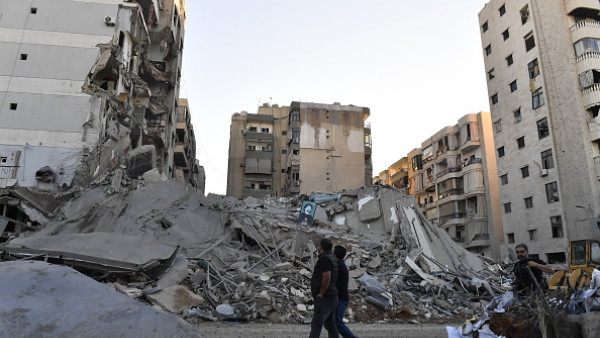Hezbollah leader Naim Qassem said Israel cannot impose conditions for a truce [Getty]
Hezbollah’s leader delivered a defiant speech on Wednesday, saying Israel cannot impose conditions for a truce in Lebanon, as visiting US envoy Amos Hochstein headed to Israel to try to negotiate an end to the war.
Israeli Foreign Minister Gideon Saar, in a near-simultaneous statement, said any ceasefire deal must ensure Israel still has the “freedom to act” against Hezbollah.
Hochstein said in Beirut that he would head to Israel on Wednesday to try to seal a ceasefire agreement over the war on Lebanon, which escalated in late September after nearly a year of deadly exchanges of fire across Israel’s northern border.
Israel has vowed to secure the north and allow tens of thousands of people displaced by the cross-border hostilities to return home.
“Israel cannot defeat us and cannot impose its conditions on us,” Hezbollah leader Naim Qassem said in an address broadcast shortly after Hochstein announced his travel plans.
Qassem added that Hezbollah sought a “complete and comprehensive end to the aggression” and “the preservation of Lebanon’s sovereignty”.
He also vowed that the response to recent deadly Israeli strikes on Beirut would be on “central Tel Aviv”, Israel’s densely populated commercial hub.
Before heading to Israel, Hochstein met for a second time with Lebanon’s parliament speaker Nabih Berri, who has led mediation efforts on behalf of Hezbollah.
Wednesday’s meeting “made additional progress, so I will travel from here in a couple hours to Israel to try to bring this to a close if we can”, Hochstein told reporters in the Lebanese capital.
Hochstein had said on Tuesday that an end to the war was “within our grasp”.
Ahead of his arrival, Israel’s top diplomat Saar said: “In any agreement we will reach, we will need to keep the freedom to act if there will be violations.”
Intensifying attacks on Lebanon
Hezbollah began its cross-border attacks in support of its Hamas after Israel launched a deadly war on Gaza on 7 October 2023.
Israel’s war on Gaza, which has killed over 43,985 and wounded over 100,000 others, came in response to a Hamas-led attack which killed 1,206 people, mostly civilians, according to an AFP tally of Israeli official figures.
The war on Gaza has also created a grinding humanitarian crisis, with residents suffering shortages of everything from food to fuel and medicine.
The Jordanian army said on Wednesday that it had dispatched eight helicopters loaded with more than seven tonnes of food, medicine and supplies for children to Gaza, where it would be handed over to the World Food Programme near the southern city of Khan Yunis.
It was the first time Jordanian aircraft would land in Gaza to deliver aid in more than a year of fighting.
Since expanding its operations from Gaza to Lebanon in September, Israel has conducted extensive bombing in areas beyond the border.
Israel has also sent ground troops into southern Lebanon, where it said on Wednesday one soldier had been killed – the 50th to fall in Lebanon since the start of ground operations.
More than 3,544 people in Lebanon have been killed since the clashes began, authorities have said, most since late September. Among them were more than 200 children, according to the United Nations.
Israel has also recently intensified strikes on neighbouring Syria. In the latest reported attack, the Syrian defence ministry said 36 people were killed and more than 50 wounded in Israeli strikes on the oasis city of Palmyra.

